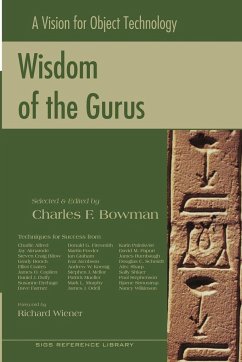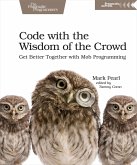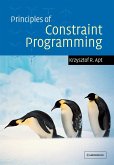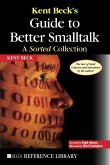Wisdom of the Gurus
A Vision for Object Technology
Herausgeber: Bowman, Charles; Firesmith, Donald G.
Wisdom of the Gurus
A Vision for Object Technology
Herausgeber: Bowman, Charles; Firesmith, Donald G.
- Broschiertes Buch
- Merkliste
- Auf die Merkliste
- Bewerten Bewerten
- Teilen
- Produkt teilen
- Produkterinnerung
- Produkterinnerung
Wisdom of the Gurus contains up-to-date articles by the top gurus in object technology, including Bilow, Booch, Coplien, Duffy, Jacobson, Meller, Odell, Rumbaugh, and Shlaer. The editor of this volume has culled the best and most relevant articles from JOOP, Object Magazine, C++ Report, ROAD, and The Smalltalk Report. The result is a single comprehensive source for advanced information on OT. Timely, accurate, and advanced, this book covers every facet of the object-oriented paradigm.
Andere Kunden interessierten sich auch für
![Leveraging the Wisdom of the Crowd in Software Testing Leveraging the Wisdom of the Crowd in Software Testing]() Mukesh SharmaLeveraging the Wisdom of the Crowd in Software Testing76,99 €
Mukesh SharmaLeveraging the Wisdom of the Crowd in Software Testing76,99 €![Code with the Wisdom of the Crowd Code with the Wisdom of the Crowd]() Mark PearlCode with the Wisdom of the Crowd27,99 €
Mark PearlCode with the Wisdom of the Crowd27,99 €![The Clausal Theory of Types The Clausal Theory of Types]() D. A. WolframThe Clausal Theory of Types35,99 €
D. A. WolframThe Clausal Theory of Types35,99 €![The Clausal Theory of Types The Clausal Theory of Types]() D. A. WolframThe Clausal Theory of Types80,99 €
D. A. WolframThe Clausal Theory of Types80,99 €![The Haskell School of Expression The Haskell School of Expression]() Paul HudakThe Haskell School of Expression66,99 €
Paul HudakThe Haskell School of Expression66,99 €![Principles of Constraint Programming Principles of Constraint Programming]() Krzysztof AptPrinciples of Constraint Programming58,99 €
Krzysztof AptPrinciples of Constraint Programming58,99 €![Kent Beck's Guide to Better Smalltalk Kent Beck's Guide to Better Smalltalk]() Kent BeckKent Beck's Guide to Better Smalltalk79,99 €
Kent BeckKent Beck's Guide to Better Smalltalk79,99 €-
-
-
Wisdom of the Gurus contains up-to-date articles by the top gurus in object technology, including Bilow, Booch, Coplien, Duffy, Jacobson, Meller, Odell, Rumbaugh, and Shlaer. The editor of this volume has culled the best and most relevant articles from JOOP, Object Magazine, C++ Report, ROAD, and The Smalltalk Report. The result is a single comprehensive source for advanced information on OT. Timely, accurate, and advanced, this book covers every facet of the object-oriented paradigm.
Hinweis: Dieser Artikel kann nur an eine deutsche Lieferadresse ausgeliefert werden.
Hinweis: Dieser Artikel kann nur an eine deutsche Lieferadresse ausgeliefert werden.
Produktdetails
- Produktdetails
- Verlag: Cambridge University Press
- Seitenzahl: 468
- Erscheinungstermin: 27. Februar 2014
- Englisch
- Abmessung: 229mm x 152mm x 25mm
- Gewicht: 672g
- ISBN-13: 9780134998497
- ISBN-10: 0134998499
- Artikelnr.: 21231357
- Herstellerkennzeichnung
- Libri GmbH
- Europaallee 1
- 36244 Bad Hersfeld
- gpsr@libri.de
- Verlag: Cambridge University Press
- Seitenzahl: 468
- Erscheinungstermin: 27. Februar 2014
- Englisch
- Abmessung: 229mm x 152mm x 25mm
- Gewicht: 672g
- ISBN-13: 9780134998497
- ISBN-10: 0134998499
- Artikelnr.: 21231357
- Herstellerkennzeichnung
- Libri GmbH
- Europaallee 1
- 36244 Bad Hersfeld
- gpsr@libri.de
Part I. Object Modelling: 1. Association multiplicity D. M. Papurt
2. Additional aspects of association D. M. Papurt
3. Well-structured object-oriented architectures G. Booch
4. From analysis to design using templates, part 1 J. J. Odell and M. Fowler
5. From analysis to design using templates, part 2 J. J. Odell and M. Fowler
6. From analysis to design using templates, part 3 J. J. Odell and M. Fowler
7. A non-procedural process model for object-oriented software development I. Graham
8. Business rules J. J. Odell
9. Systems of interconnected systems I. Jacobson, with K. Palmkvist and S. Dyrhage
Part II. Development Methodologies: 10. Object-oriented requirements analysis, part I: finding abstractions and their relationships D. J. Duffy
11. Object-oriented requirements analysis, part 1: dynamic modeling D. J. Duffy
12. Object-oriented requirements analysis, part 2: system responsibilities, functional modeling, and scalability issues D. J. Duffy
13. Use cases in large-scale systems I. Jacobson
14. Formalizing use-case modeling I. Jacobson
15. Defining and developing user-interface intensive applications with use cases S. C. Bilow
16. Use cases: the pros and cons D. G. Firesmith
17. Formalizing the output N. M. Wilkinson
18. Formalizing the output, part 2 N. M. Wilkinson
19. A private workspace: why a shared repository is bad for large projects J. Rumbaugh
20. Object-oriented regression testing D. G. Firesmith
21. A vision S. Shlaer
22. The development team G. Booch
Part III. Patterns: 23. Pattern languages for organization and process J. O. Coplien
24. Patterns and idioms in circles, complex ellipses, and real bridges J. O. Coplien
25. Pattern mining J. O. Coplien
26. Observations on the role of patterns in Object-oriented software development C. Alfred and S. J. Mellor
27. Using design patterns to evolve system software from UNIX to Windows NT D. C. Schmidt and P. Stephenson
Part IV. Languages: 28. The beauty and power of C++ E. Coates
29. A perspective on ISO C++ B. Stroustrup
30. Introduction to iterator adaptors A. W. Koenig
31. Function objects, templates, and inheritance A. W. Koenig
32. Managing concurrency conflicts in Smalltalk J. Almarode
33. Coverage analysis in Smalltalk M. L. Murphy
34. Processes A. Sharp and D. Farmer
35. Transactions in Smalltalk J. Almarode
36. Building a gopher from sockets and widgets P. Mueller.
2. Additional aspects of association D. M. Papurt
3. Well-structured object-oriented architectures G. Booch
4. From analysis to design using templates, part 1 J. J. Odell and M. Fowler
5. From analysis to design using templates, part 2 J. J. Odell and M. Fowler
6. From analysis to design using templates, part 3 J. J. Odell and M. Fowler
7. A non-procedural process model for object-oriented software development I. Graham
8. Business rules J. J. Odell
9. Systems of interconnected systems I. Jacobson, with K. Palmkvist and S. Dyrhage
Part II. Development Methodologies: 10. Object-oriented requirements analysis, part I: finding abstractions and their relationships D. J. Duffy
11. Object-oriented requirements analysis, part 1: dynamic modeling D. J. Duffy
12. Object-oriented requirements analysis, part 2: system responsibilities, functional modeling, and scalability issues D. J. Duffy
13. Use cases in large-scale systems I. Jacobson
14. Formalizing use-case modeling I. Jacobson
15. Defining and developing user-interface intensive applications with use cases S. C. Bilow
16. Use cases: the pros and cons D. G. Firesmith
17. Formalizing the output N. M. Wilkinson
18. Formalizing the output, part 2 N. M. Wilkinson
19. A private workspace: why a shared repository is bad for large projects J. Rumbaugh
20. Object-oriented regression testing D. G. Firesmith
21. A vision S. Shlaer
22. The development team G. Booch
Part III. Patterns: 23. Pattern languages for organization and process J. O. Coplien
24. Patterns and idioms in circles, complex ellipses, and real bridges J. O. Coplien
25. Pattern mining J. O. Coplien
26. Observations on the role of patterns in Object-oriented software development C. Alfred and S. J. Mellor
27. Using design patterns to evolve system software from UNIX to Windows NT D. C. Schmidt and P. Stephenson
Part IV. Languages: 28. The beauty and power of C++ E. Coates
29. A perspective on ISO C++ B. Stroustrup
30. Introduction to iterator adaptors A. W. Koenig
31. Function objects, templates, and inheritance A. W. Koenig
32. Managing concurrency conflicts in Smalltalk J. Almarode
33. Coverage analysis in Smalltalk M. L. Murphy
34. Processes A. Sharp and D. Farmer
35. Transactions in Smalltalk J. Almarode
36. Building a gopher from sockets and widgets P. Mueller.
Part I. Object Modelling: 1. Association multiplicity D. M. Papurt
2. Additional aspects of association D. M. Papurt
3. Well-structured object-oriented architectures G. Booch
4. From analysis to design using templates, part 1 J. J. Odell and M. Fowler
5. From analysis to design using templates, part 2 J. J. Odell and M. Fowler
6. From analysis to design using templates, part 3 J. J. Odell and M. Fowler
7. A non-procedural process model for object-oriented software development I. Graham
8. Business rules J. J. Odell
9. Systems of interconnected systems I. Jacobson, with K. Palmkvist and S. Dyrhage
Part II. Development Methodologies: 10. Object-oriented requirements analysis, part I: finding abstractions and their relationships D. J. Duffy
11. Object-oriented requirements analysis, part 1: dynamic modeling D. J. Duffy
12. Object-oriented requirements analysis, part 2: system responsibilities, functional modeling, and scalability issues D. J. Duffy
13. Use cases in large-scale systems I. Jacobson
14. Formalizing use-case modeling I. Jacobson
15. Defining and developing user-interface intensive applications with use cases S. C. Bilow
16. Use cases: the pros and cons D. G. Firesmith
17. Formalizing the output N. M. Wilkinson
18. Formalizing the output, part 2 N. M. Wilkinson
19. A private workspace: why a shared repository is bad for large projects J. Rumbaugh
20. Object-oriented regression testing D. G. Firesmith
21. A vision S. Shlaer
22. The development team G. Booch
Part III. Patterns: 23. Pattern languages for organization and process J. O. Coplien
24. Patterns and idioms in circles, complex ellipses, and real bridges J. O. Coplien
25. Pattern mining J. O. Coplien
26. Observations on the role of patterns in Object-oriented software development C. Alfred and S. J. Mellor
27. Using design patterns to evolve system software from UNIX to Windows NT D. C. Schmidt and P. Stephenson
Part IV. Languages: 28. The beauty and power of C++ E. Coates
29. A perspective on ISO C++ B. Stroustrup
30. Introduction to iterator adaptors A. W. Koenig
31. Function objects, templates, and inheritance A. W. Koenig
32. Managing concurrency conflicts in Smalltalk J. Almarode
33. Coverage analysis in Smalltalk M. L. Murphy
34. Processes A. Sharp and D. Farmer
35. Transactions in Smalltalk J. Almarode
36. Building a gopher from sockets and widgets P. Mueller.
2. Additional aspects of association D. M. Papurt
3. Well-structured object-oriented architectures G. Booch
4. From analysis to design using templates, part 1 J. J. Odell and M. Fowler
5. From analysis to design using templates, part 2 J. J. Odell and M. Fowler
6. From analysis to design using templates, part 3 J. J. Odell and M. Fowler
7. A non-procedural process model for object-oriented software development I. Graham
8. Business rules J. J. Odell
9. Systems of interconnected systems I. Jacobson, with K. Palmkvist and S. Dyrhage
Part II. Development Methodologies: 10. Object-oriented requirements analysis, part I: finding abstractions and their relationships D. J. Duffy
11. Object-oriented requirements analysis, part 1: dynamic modeling D. J. Duffy
12. Object-oriented requirements analysis, part 2: system responsibilities, functional modeling, and scalability issues D. J. Duffy
13. Use cases in large-scale systems I. Jacobson
14. Formalizing use-case modeling I. Jacobson
15. Defining and developing user-interface intensive applications with use cases S. C. Bilow
16. Use cases: the pros and cons D. G. Firesmith
17. Formalizing the output N. M. Wilkinson
18. Formalizing the output, part 2 N. M. Wilkinson
19. A private workspace: why a shared repository is bad for large projects J. Rumbaugh
20. Object-oriented regression testing D. G. Firesmith
21. A vision S. Shlaer
22. The development team G. Booch
Part III. Patterns: 23. Pattern languages for organization and process J. O. Coplien
24. Patterns and idioms in circles, complex ellipses, and real bridges J. O. Coplien
25. Pattern mining J. O. Coplien
26. Observations on the role of patterns in Object-oriented software development C. Alfred and S. J. Mellor
27. Using design patterns to evolve system software from UNIX to Windows NT D. C. Schmidt and P. Stephenson
Part IV. Languages: 28. The beauty and power of C++ E. Coates
29. A perspective on ISO C++ B. Stroustrup
30. Introduction to iterator adaptors A. W. Koenig
31. Function objects, templates, and inheritance A. W. Koenig
32. Managing concurrency conflicts in Smalltalk J. Almarode
33. Coverage analysis in Smalltalk M. L. Murphy
34. Processes A. Sharp and D. Farmer
35. Transactions in Smalltalk J. Almarode
36. Building a gopher from sockets and widgets P. Mueller.








